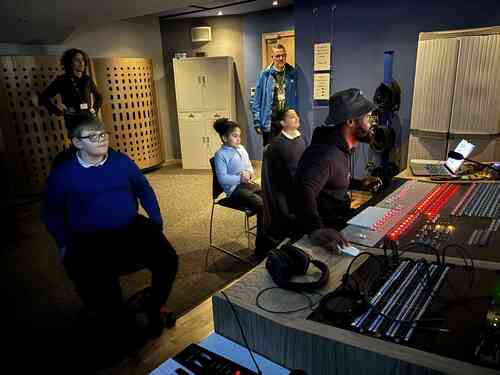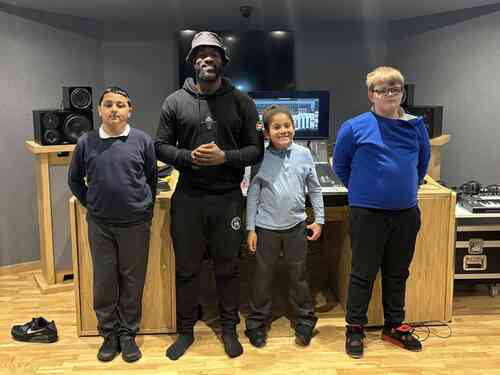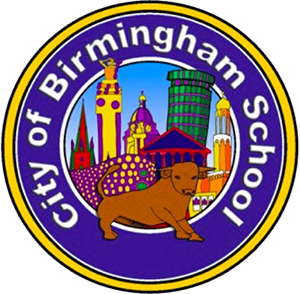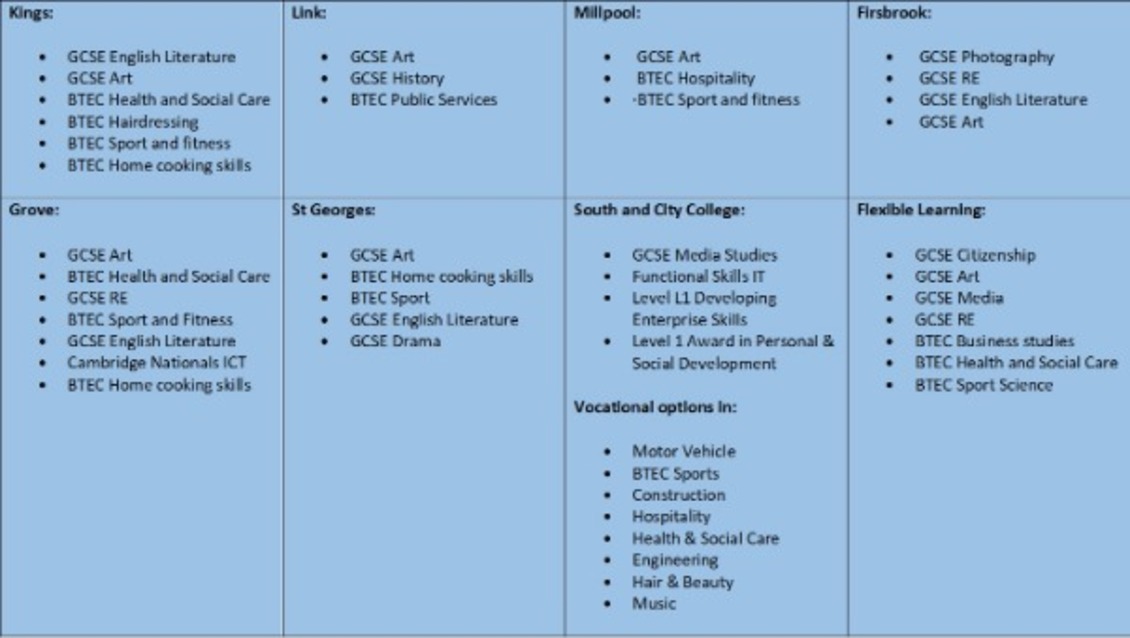Whole School Curriculum Overview
The Curriculum
At City of Birmingham School we offer a broad and ambitious curriculum that seeks to unlock the potential of our pupils. Many of our pupils have had a disrupted, and often turbulent, education prior to coming to City of Birmingham School and as such we offer a curriculum that re-engages pupils with education, prepares them for a successful return into school and challenges them to be the best that they can be. We have high expectations of all of our pupils and believe that we provide the right environment to help them thrive. At the centre of our curriculum offer is the intention of:
- Ensuring pupils are not disadvantaged by exclusion
- Keeping pupils safe
- Building confidence in educational settings, supporting them to return to a school when appropriate
- Closing any gaps in learning
- Challenging pupils to exceed their own expectations
- Providing a range of diverse enrichment opportunities
- Identifying unknown skills and dreams
- Ensuring that age appropriate pupils leave us with a range of recognised qualifications and can successfully access a further education placement
- Developing pupils with education, knowledge, language and habits that are valued by society
- Providing life changing opportunities for pupils
- Developing pupils to become resilient, accepting challenge and tolerate other viewpoints
We achieve the above through the delivery of a carefully planned programme of study for pupils. Although pupils are placed at one of our eight campuses in the city, largely dependent on space availability at the time of exclusion, their curriculum offer is consistent across the school. We have curriculum leaders across the school who lead the development and planning of their subject area in line with our above intentions.
WHAT WILL MY CHILD BE LEARNING AT CITY OF BIRMINGHAM SCHOOL?
PRIMARY
Pupils will be placed at our primary campus, Stratford Park. Every pupil is expected to attend full time (8.30am – 2.00pm) and will be assigned to a class dependent on age and individual needs. The class teacher will be in regular contact with parents and carers.
We do not want to disadvantage our pupils and want to support them in being able to go back to a main stream school when they are ready. As such, we follow the national curriculum and ensure that our pupils are challenged appropriately. Pupils at primary will access the following subjects, with Reading, Writing and Maths being taught on a daily basis:
- Reading
- Writing
- Maths
- Science
- PSHE
- RE
- Art
- History
- Geography
- PE
- Design & Technology
Please find further information about subject content The national curriculum in England - Framework document (publishing.service.gov.uk)
At the end of Key Stage 2 most pupils will take SATs. These tests are an indicator of the progress your child has made at school so far and will show what level your child is currently working at. For more information about SATs, please speak to your child’s class teacher and have a look at the information available here: Everything you need to know about SATs - The Education Hub (blog.gov.uk)
SECONDARY
KS3:
Pupils will be placed in one of our 3 KS3 Campuses – Oxted Hall, Millpool or Grove. Every pupil is expected to attend full time (8.30am – 2.00pm) and will be assigned to a form tutor. The form tutor will be in regular contact with parents and carers.
We work hard to ensure that our Key Stage 3 pupils have every opportunity to be successful in reintegrating back into a mainstream school. As such, we offer a timetable of national curriculum subjects that supports them in returning to school without any significant gaps in learning. Our pupils access the following subjects:
- English
- Maths
- Science
- PSHE
- RE
- Geography
- History
- PE
- Art/cooking/design and technology*
- Life skills and character education
- Enrichment
*dependent on resources available at each campus
Pupils who remain with us at the end of year 9 may move campuses for their Key Stage 4 education. This is dependent on a number of factors – options choices, academic ability, peer dynamics – and is decided upon with the best interest of the child in mind. There are eight possible campuses for pupils to access KS4 education in and these are detailed below. Pupils, parents and carers will be told of any planned moves in the summer term of year 9.
KS4:
Those pupils who join us in year 10 or 11 will spend two weeks being inducted into the school at Grove Campus. In this time pupils are baselined in a range of subjects in order to establish current ability levels. Further to this, they will have a personal tutor for the two weeks who will work with the pupil to identify how best they can be supported to fulfil their potential in their future placement. The tutor will also be in touch with the previous school to identify what has already been studied and whether or not there is any course work that we can utilise for GCSE or BTEC subjects. At the end of the two weeks pupils will be placed in an appropriate provision – dependant on academic interests, ability and availability. We have five of our own KS4 sites and currently commission three further alternative providers to support with some of our Key Stage 4 teaching whilst we await buildings to bring all of our education on site.
Although we support every pupil in returning to mainstream education, we also acknowledge that it can be difficult for a pupil to return towards the end of year 10 or 11 as it often means there is a change to subjects and specifications that put a pupil at a disadvantage to their peers. As such we offer a full GCSE programme for all of our KS4 pupils so that they can leave the school with a range of nationally recognise qualifications in line with those they would have taken prior to exclusion.
All pupils will be expected to take GCSEs in English, maths and science. Pupils at our own campuses will also study RE, PSHE, life skills and enrichment. Further to this, each site or provider offers a wider range of GCSE or level 1/2 options for all pupils. Outlined below are the additional subjects, including further GCSE options, currently on offer at each provider.
What else do we offer to support our pupils?
The Thrive Approach
In order to develop healthy, happy, confident children who are ready and open to learning, the City of Birmingham School has adopted The Thrive Approach.
Thrive is an approach to working with all children. It is based on neurological evidence which addresses brain development so that all children learn to regulate their emotional responses, develop resilience and manage disappointment and frustration.
Thrive provides a way of understanding and addressing the emotional and social development of all children. It helps us to check a child’s readiness to learn, to identify any gaps and then plan to meet them. Through doing so, we will be able to make sure that all of our pupils have what they need to make the best possible progress in their learning.
For more information, please look at the Thrive website https://www.thriveapproach.com/ or contact our Thrive Lead, Caroline Willis, at the following email address: [email protected]
Our primary aged pupils have access to enrichment opportunities that we feel are crucial to their development. We can guarantee that all of our primary aged pupils will leave us with the following skills:
Swimming
Swimming is great fun and helps children to stay fit and healthy. But swimming at school also teaches children vital skills on how to stay safe in and around water. We want every child to be a confident swimmer by the time they leave us.
Bike riding and achieving bike ability
Bikeability is a cycle training programme that teaches children practical skills and gives them the understanding and expertise they need to ride their bikes on the road
Careers Education
At City of Birmingham School we have a careers advisor who works with all of our pupils across the school. As well as planning a careers curriculum across the school, including work experience opportunities and careers information days, our careers advisor offers personal guidance to all pupils – this includes working with individual pupils in years 10 and 11 to help them with apply for appropriate post 16 provision.
For more information, or if you have any queries, about careers education, please contact Mrs D Bhandari on the following email address: [email protected] or mobile 07943 808 845.
Life Skills and Character Education
Adult life requires a range of skills in order for people to flourish, both in the workplace and in their daily lives, from the confidence and motivation to seek challenges and complete tasks, to the interpersonal skills that aid teamwork and other social interactions. These essential life skills are crucial to people achieving their potential and as such we offer a life skills and character education programme to our Key Stage 3 and 4 pupils.
This offer includes, but is not limited to learning about the following:
- Respect
- Financial skills
- Cooking
- Motivation
- Communication
- Leadership
- Organisation
- Resilience
- Initiative
Chess
Chess is a universal game, knowing no boundaries of age, gender, faith, ethnicity or disability. It promotes key intellectual skills such as problem solving, logical thinking, pattern recognition and concentration. Playing chess also fosters intellectual character. Its reputation boosts self-esteem and gives children the ability to cope with adversity, which helps pupils grow into rounded and employable individuals. It does this by teaching children how to lose and how to win gracefully, to think ahead and foresee the consequences of their actions. Every single pupil has access to chess lessons on a rotational basis each half term.
Therapy Dogs
In our primary campus we offer pupils the opportunity to work with therapy dogs. Research into the effectiveness of therapy dogs in schools indicates that benefits include:
- Cognitive – companionship with a dog stimulates memory, problem-solving and game-playing
- Social – a dog provides a positive mutual topic for discussion, encourages responsibility, wellbeing and focused interaction with others
- Emotional – a school dog improves self-esteem, acceptance from others and lifts mood, often provoking laughter and fun. Dogs can also teach compassion and respect for other living things as well as relieving anxiety.
- Physical – interaction with a furry friend reduces blood pressure, provides tactile stimulation, assists with pain management, gives motivation to move, walk and stimulates the senses
- Environmental – a dog in a school increases the sense of a family environment, with all of the above benefits continuing long after the school day is over.
- Reading – reading to dogs has been proven to help children develop literacy skills and build confidence, through both the calming effect the dog’s presence has on children as well as the fact that a dog will listen to children read without being judgemental or critical. This comforting environment helps to nurture children’s enthusiasm for reading and provides them with the confidence to read aloud.
The dogs used will be highly trained therapy dogs and used to working with children. However, we will always first seek parental consent for children spending time with the dogs.
MAC Makes Music
MAC Makes Music is an award-winning programme providing innovative music making opportunities for children and young people with limited access to music provision. We work with Families, Pupil Referral Units, Charities, Primary Schools, Children’s Services, Centres for Newly Arrived Children and Young People, Resource Bases/Focus Provisions and Special Schools to influence sustained music making activity for those with limited access to music provision.
Our passion is to offer young people high quality music making experiences led by a team of highly experienced musicians. The young person’s voice and creativity is at the heart of a diverse music offer in new music technology, song writing, band development, singing and music production.


Dallagio Rugby Works
Our KS4 pupils have access to the Rugby Works programme which is an intensive, long-term skills development programme based on the values of rugby. Rugby players and coaches come into our Kings campus on a weekly basis and work with pupils through mentoring, classroom based support and rugby to help them to get into sustained education, employment or training upon finishing their GCSEs.
Fit4Life
The benefits of physical activity for children include:
- Building confidence and improving social skills
- Develops coordination
- Enhances concentration
- Makes children feel good and elevates their mood
- Inspires positivity and encourages tolerance
- Helps to relieve stress and maintain mental and emotional wellbeing
- Improves sleep and energy levels
- Reduces the risk of morbidity and mortality from chronic non-communicable diseases
- Improves overall health and fitness and helps children maintain a healthy weight to prevent childhood obesity
Consequently, we place high value on physical education for our pupils. Alongside PE lessons, we have teamed up with Dr. Zoe Williams and the Fit4Life team. They are working with some of our secondary aged pupils to educate them about the importance of life long fitness and, using physical activity as a vehicle for change, aim to improve the health and well-being and confidence of our pupils. Through 1:1 work and group sessions, the Fit4Life team provide exciting sporting opportunities, offer positive role models and mentors and raise the life aspirations of our pupils











